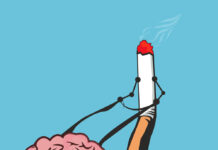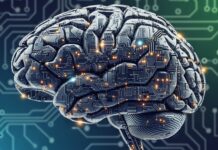While a great deal of the excitement about advances in psychological treatments comes from the potential for research in neuroscience to unlock the secrets of the brain, many mental health experts would like to temper this enthusiasm. A special issue of the Behavior Therapist released this month calls into question the predominant conception of mental illnesses as brain disorders.
The biomedical model of mental illness assumes that abnormal psychological states or experiences are the results of abnormalities in the brain or genetics and, as such, necessitate medical or chemical treatments that specifically target these biological abnormalities. In his introduction to the special issue, Jonathan Abramowitz, a psychologist at the Unversity of North Carolina at Chapel Hill and the president of the Association for Behavioral and Cognitive Therapies, points out that while it is tempting to think of mental illnesses as diseases like diabetes, “the truth is that there is no credible scientific evidence for this assumption.”
Abramowitz goes further and points to research that suggests that this medical model of mental illness may actually increase the stigma and social distancing felt by those diagnosed with mental disorders. Antistigma campaigns have promoted the idea that thinking of mental illness as a disease will convince the public that those with disorders are victims of their biology, thus reducing shame. Research by Schomerus, Deacon, Baird, and others, however, reveals that thinking about mental illness in this way serves to “reinforce (unfounded) concerns about the chronic and untreatable nature of mental disorders” and has increased a desire among the public to avoid those labeled with a mental illness.
The special issue includes several significant contributions from award-winning scientists and journalists, including Mad In America founder Robert Whitaker. The editors indicate that proponents of the medical model were invited to submit pieces but declined. The medical model proponents included NIMH director Thomas Insel, National Institute on Drug Abuse director Nora Volkow, and former president of the American Psychiatric Association (APA) Jeffrey Leiberman.
A list of all of the articles included appears below. To access the full issue click here →
Jonathan S. Abramowitz- The Biomedical Model: Caveat Emptor
Brett Deacon and Dean McKay– Introduction to the Special Issue
Scott O. Lilienfeld, Seth J. Schwartz, Alan Meca, Katheryn C. Sauvigné, Sally Satel- Neurocentrism: Implications for Psychotherapy Practice and Research
Kichuk, Matthew S. Lebowitz, T. Grover Adams Jr.- Can Biomedical Models of Psychopathology Interfere With Cognitive-Behavioral Treatment Processes?
Amitai Abramovitch and Avraham Schweiger- Misuse of Cognitive Neuropsychology in Psychiatry Research: The Intoxicating Appeal of Neo-Reductionism
Robert Whitaker- Anatomy of an Epidemic: The History and Science of a Failed Paradigm of Care
Glen Spielmans- When Marketing Met Science: Evidence Regarding Modern Antidepressants and Antipsychotic Medications
Jeffrey R. Lacasse and Jonathan Leo- Antidepressants and the Chemical Imbalance Theory of Depression: A Reflection and Update on the Discourse
Joanna Moncrieff- The Myths and Realities of Drug Treatment for Mental Disorders
Stanton Peele- Why Neurobiological Models Can’t Contain Mental Disorder and Addiction
Steven C. Hayes, Brandon T. Sanford, Timothy K.- Feeney Using the Functional and Contextual Approach of Modern Evolution Science to Direct Thinking About Psychopathology
Peter Kinderman– A Psychological Model of Mental Health and Well-Being: Rational but Radical
Brett J. Deacon and Dean McKay- The Biomedical Model of Psychological Problems: A Call for Critical Dialogue















This looks like a great magazine issue, am going to check it out.
What a surprise that Lieberman and Insel did not see fit to share their wisdom.
I have a personal experience with the disease model of mental illness that this magazine brings to mind. I was going to 12-step meetings some years ago for an addictive behavior. At the meeting this old man kept saying things like, “This disease of addiction is just so insidious,” “we’ll never overcome this disease, but we can learn to live with it,” “part of my recovery has been accepting that I truly have a disease that I don’t have control over.”
Every time he said something like this, I wanted to stand up and shout, “SHUT THE F–K UP, YOU STUPID, OLD, UNINFORMED IDIOT!”
It was just so pathetic, false, damaging, and absurd. This sad old man probably still believes those lies today, lies which prevent him from understanding the psychological and social factors which may have led to him becoming addicted in the first place. What a waste. This type of bullshit is what eventually led to me leaving 12-step groups, which are increasingly becoming infected by the disease model virus.
Report comment
Recently I was looking for a local group that might give me support in my effort to lose weight. I did find a group that meets regularly in a nearby hospital, but it too was based on this 12-step system. I am against this system because instead of empowering people it reinforces their feelings of powerlessness and teaches them that they must rely on an external power, i.e., God.
Report comment
That is exactly how I felt when I went to an Overeater’s Anonymous group several years ago. It made zero sense to me that I would be powerless over food the rest of my life. So I purchased an empowering book on the issue that taught me how to treat food as the friend and how to eat in response to hunger cues. Unfortunately, when I later went on psych meds, those cues got destroyed but that is another post.
BPD, I wanted to shout the same thing at the OA meeting. LOL!
Report comment
I am glad to hear there are other who don’t buy in to the tired, misleading slogans of 12-step like “powerless over addiction” and “giving up control to God”. As an agnostic this was particularly unhelpful to me. Having said this, there are nice people at 12-step and it’s sometimes possible to benefit despite these bizarre approach founded on some early 20th century guy’s Puritanical beliefs.
I do wish I had spoken up not in those particular words but in clear, respectful, direct phrases. I remember I used to say to introduce myself, “I have a problem with compulsive use of X” or “I’m addicted to X” rather than “I am an X addict”. I was the only one in the room who would say it that way; everyone else would be saying, “I am a X addict”. People would notice that I said it was different.
Report comment
Psychiatrists William Glasser, creator of Reality Therapy and Choice Theory, Peter Breggin and many others have been saying this for decades. It suits big pharma, insurance companies and what appears to be be the majority of psychiatrists to insist otherwise, despite the lack of evidence. Hopefully those who support this idea will be taken more seriously as time goes on.
Report comment
Abramowitz goes further and points to research that suggests that this medical model of mental illness may actually increase the stigma and social distancing felt by those diagnosed with mental disorders…
Saying “the medical model of mental illness” is redundant. If you’re using the term “mental illness” you are using the medical model, otherwise the idea of “illness” would not be involved.
Antistigma campaigns have promoted the idea that thinking of mental illness as a disease will convince the public that those with disorders are victims of their biology, thus reducing shame.
Shame? For what? At any rate, what is this, a medical science as purported or some kind of p.r. campaign to make the public less judgemental towards those who have already been judged as “other”? So if some other nomenclature (demonic possession?) were more effective in garnering public respect that would be fine with the “anti-stigma” crowd?
Report comment
Whats really sad is people are working as professionals and they don’t even know all this biological stuff is just unproven theory and often downright lies pushed as fact to sell drugs.
I believed the lies for a long time too, like the one that says feeling depressed is because of low serotonin.
I had no idea “medicine” worked like this. I though medical people were the most honorable people on earth dedicated to health and healing and never questioned it. Then they almost killed me and made me sick for years with psychiatry and finally read a few books on how it really works and how disgusting and corrupt psycho pharmaceutical industry really is.
Its sad it really is.
Report comment
Yes, once you’re forced to research medicine so you can medically explain how doctors made you sick, and find the medical explanation. Then you learn that a million children were made supposedly terminally ill, in essentially the same manner as you. And get to the point you’re interviewed, and asked by the end of the interview, “So, how does it feel to know more than the doctors?” And an ethical pastor confesses to you that the way you were may sick, and the motives for the iatrogenesis you dealt with, is known as the “dirty little secret of the two original educated professions,” thus a crime known by the “educated” for a long time. All culminating in your well respected and ethical new PCP being unable to outwit your medical research and theology, so at your next physical, he has you teach his students, and calls you “one in a million.” You do get to the point, it becomes very difficult to have faith in the overall ethics, or respect for the claimed knowledge base, of either the medical or religious professions.
But, the ensuing learning of societal educational betrayal doesn’t end there, because your father’s industry (the banking industry) goes from being among the most respected to the most despised, while you were “sleeping” (being drugged and researching medicine). You learn your politicians have become not much more than war mongering slaves for their new banking masters.
Then you do a little research into who these “too big to fail” and Fed bankers who’ve taken control of the US actually are, and this is where you learn all the history your were ever taught, and almost everything we’re told in the main stream media, is likely based upon lies too. And then you find the playbook seemingly being used by today’s banking and corporate “elite.” And realize all the evil going on in this world today was well planned out, over a century ago, and we have had the wrong people, behind the scenes, in charge – financing all this misinformation, all the resulting evil and damage to way too many humans – for way too long.
I do so hope the medical community does wake up, and actually thinks about the scientifically invalid beliefs they are being taught. And also researches into who actually owns the public and private organizations that are funding the educational system and non-profits that are miseducating so many, and what their potential motives and goals for doing so are. The truth is out there, and it’s not pretty, and it’s not “politically correct.”
But the decent and “educated” do need to wake up, acknowledge, and fight against the misinformation, and evil ones propagating it. And, unfortunately, there is evil. I personally believe we are in a war between the money worshippers and decent humans, perhaps it’s a spiritual war, but it’s not a “religious” war, as propagandized. There is good and evil within all religions, professions, and people. The decent within humanity need to stand up against the money creators, or a Jesus said, against the “money changers.” Same old, same old societal problems. It’s just that we’re now dealing with this problem on a global scale.
Report comment